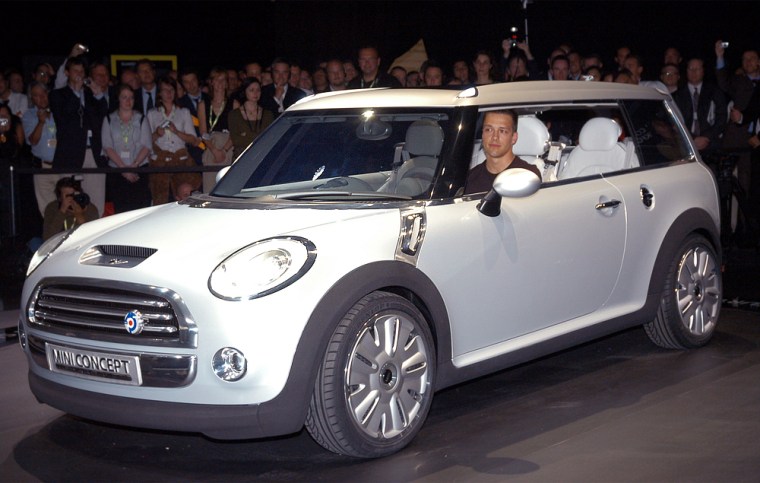With high gas prices forcing consumers to fork over fistfuls of euros, dollars and yen to power their cars, automakers see an opportunity not only to produce more fuel-efficient cars, but grab important market share in the process.
Across the hundreds of displays and booths at the Frankfurt auto show, the smaller, more fuel-efficient cars from France's Renault SA, South Korea's Kia Motors Corp. and Hyundai Motor Co. and even China's Geely Holding Group are drawing more attention and questions.
That's no surprise, analysts say, since smaller cars like Fiat SpA's Panda and Renault's Clio can get more mileage out of a liter of gas than a larger Mercedes or Range Rover.
In the European Union last year, small cars accounted for 33.4 percent of the entire market, up from 30.4 percent in 1990, according to the European Automobile Manufacturers Association.
Mark Fulthorpe, a London-based analyst with CSM Worldwide, said small cars have always proven popular because of their good gas mileage and lower costs.
But now with companies like BMW AG, which sells the reborn Mini brand, and DaimlerChrysler AG, which has the Smart forTwo, seeking to expand the market, automakers can rely on better styling as well as economy to lure customers to small cars.
"They're becoming more attractive and that's definitely part of the appeal," Fulthorpe said. While there will always be a demand for SUVs and big sedans, he said, fuel economy is playing a bigger role in purchasing decisions.
"They have sought to maximize space, utility and packaging," he said.
Mini, for example, unveiled a slightly longer version of its flagship model, with more space in the back and a back-door entry akin to a larger SUV, without sacrificing sportiness or economy.
Skoda, owned by Volkswagen AG, unveiled its compact convertible SUV-style Yeti this week, with company officials saying the funky four-door could go into production in a bid to meet demand. Skoda CEO Detlef Wittig said demand for the company's small cars is expected to push 2005 sales up 10 percent to 485,000.
Bob Lutz, General Motors Corp.'s vice chairman for global product development, said the world's largest automaker has been designing vehicles with the expectation that gas prices will rise or the U.S. government will increase fuel economy standards.
"What obviously surprised us is gasoline rising from $1.50 to $3 a gallon," Lutz said.
In the aftermath of Hurricane Katrina's hit on the Gulf Coast, gas in the U.S. rose above the $3 per gallon mark, while prices in Europe _ already some of the highest in the world _ rose to double that.
In Switzerland, for example, gas was averaging a record 1.76 Swiss francs per liter ($5.30 per gallon), while in Denmark, the price for a liter of gas is about 11.2 kroner ($7.01 per gallon).
But even before Hurricane Katrina, oil producers and refiners had been struggling to meet rising demand around the globe, particularly in the U.S. and China.
Lutz said GM used to pay scant attention to small cars, which were made as cheaply as possible for entry-level consumers _ but that attitude has changed.
"The American industry has stopped considering them as commodity vehicles," Lutz said. "That's a defeatist strategy. You've got to do your best in every segment you're in."
Lewis Booth, chairman and CEO of the European division of Ford Motor Co., said developing a new small car for Europe is a top priority for the company. Ford and Fiat announced last week that they will work together on two new models, including a replacement for the Ford Ka due out in 2008 and an all-new version of the Fiat Cinquecento.
Booth said if gas prices remain high, consumers may shift to smaller vehicles or diesels. So developing fuel-efficient vehicles is critical.
"When we look at areas to save money, that's not an area we look at," Booth said.
Fiat Chairman Luca Cordero di Montezemolo said the company wants to expand more into smaller cars, focusing on the deal with Dearborn, Mich.-based Ford to build a small car in Poland. He called the agreement "the first automotive deal we've made in a while that goes in the direction other carmakers are going."
But not all automakers are focused on small cars. Chrysler Group CEO Tom LaSorda said this week that while the division is considering teaming up with another automaker to develop compact cars, it's not a priority.
"It's a tough segment to make money," LaSorda said. He added that developing a new car and entering the market would cost the company more than $1 billion.
